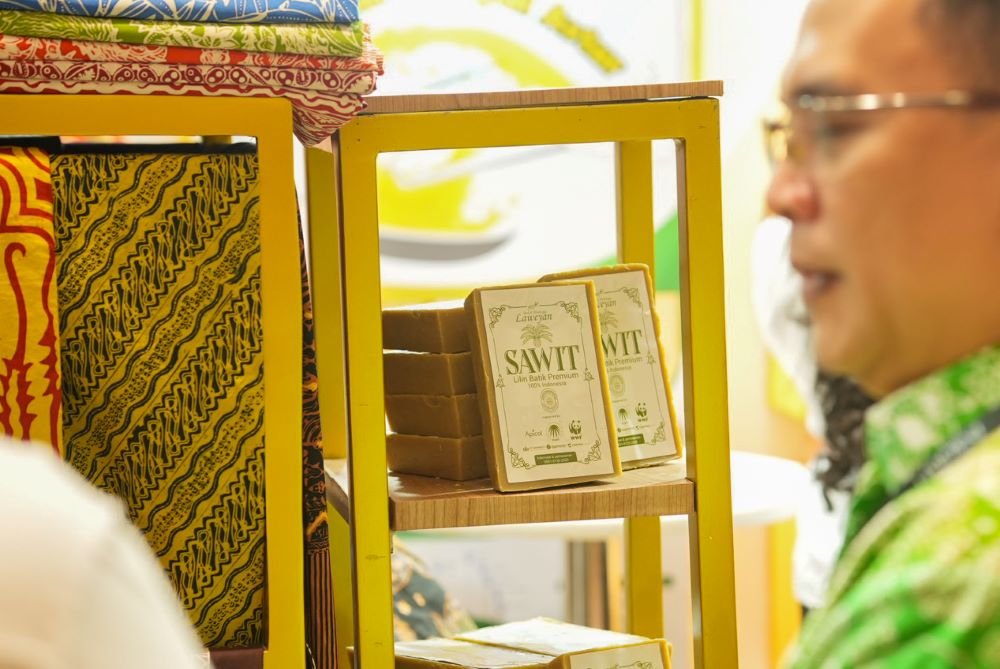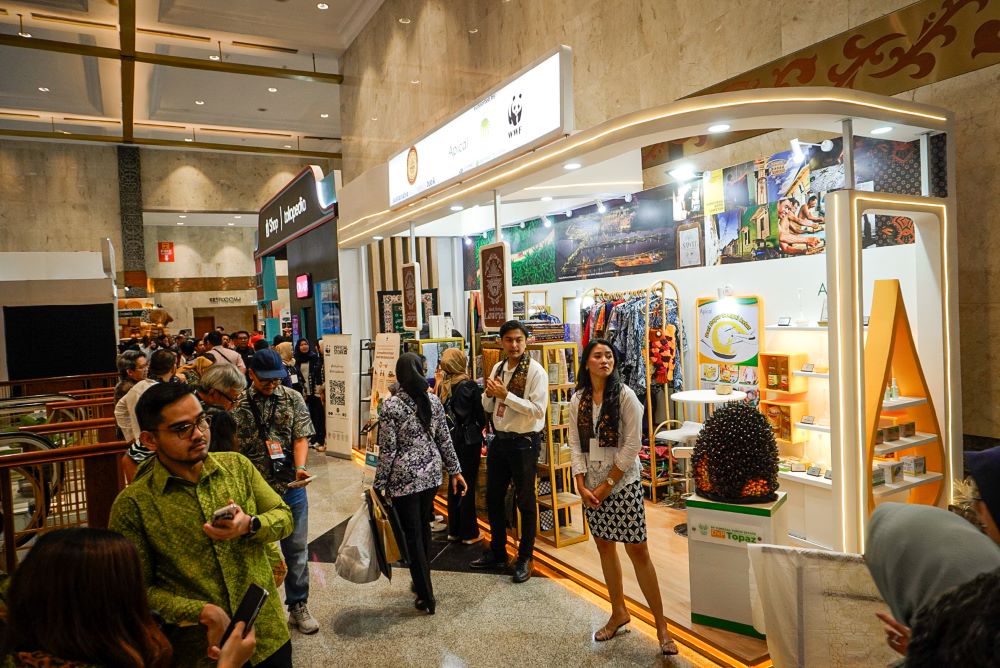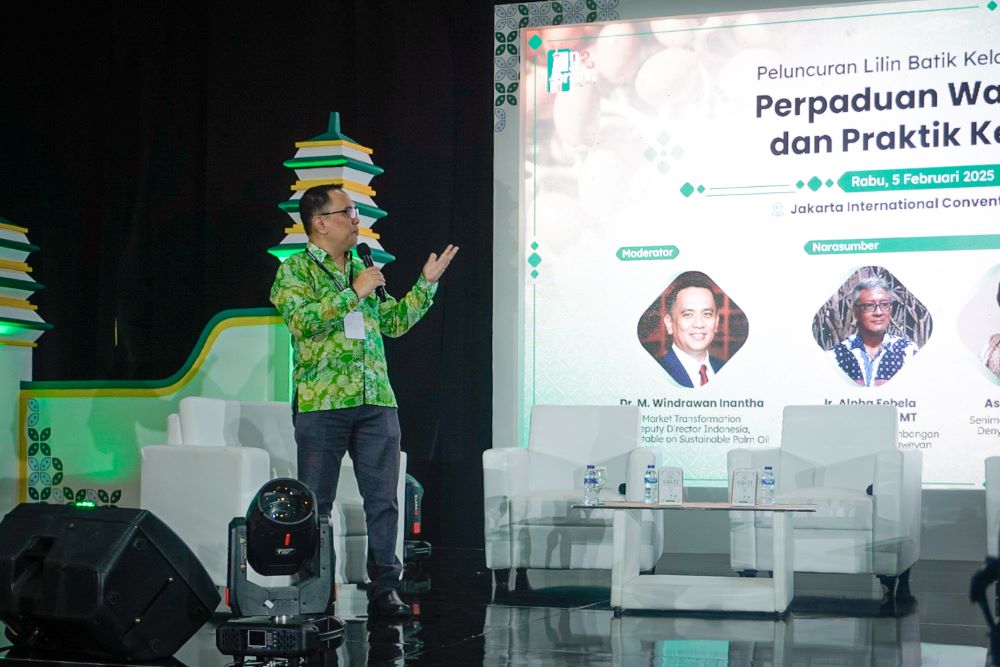Jakarta,13 February 2025 – At the national exhibition INACRAFT 2025, a collaborative effort involving FPKBL, WWF-Indonesia, RSPO, APICAL, Universitas Trisakti, Daemeter and Control Union officially launched an environmentally friendly batik product. This initiative aims to establish sustainable batik wax as a flagship product, blending Indonesia’s rich cultural heritage with sustainable practices implemented by small and medium-sized enterprises (SMEs).
WWF-Indonesia has been working with FPKBL (Forum Pengembangan Kampoeng Batik Laweyan) to develop a Sustainability Action Plan, engaging batik producers such as Batik Mahkota, Batik Tjap Tiga Negeri, Batik Tumaruntum, and Batik Isma Laweyan. While these batik businesses are classified as SMEs, their strong commitment to sustainability is inspiring and can serve as a model for other businesses yet to adopt sustainability values.

WWF-Indonesia recognises FPKBL’s dedication to sustainability, demonstrated through its initiative since 2023 to develop a batik wax (malam) formula derived from sustainable palm oil-based Hydrogenated Palm Stearin (HPS). WWF-Indonesia strongly supports this sustainability effort, as reflected in its order of batik featuring a panda motif, produced using sustainable palm-based wax.
For Apical, a leading processor of sustainable vegetable oils, the introduction of batik wax made from palm oil is more than just an innovation, it marks a significant breakthrough for the industry. Palm oil, often seen solely as a commodity, has proven to be a versatile resource with a wide range of applications that meet various societal needs.
Hydrogenated Palm Stearin (HPS), used as the raw material for batik wax, is one of the many palm oil derivatives produced by Apical. In addition to HPS, Apical also processes palm oil into food products, oleochemicals for cosmetics, animal feed, and biofuel.

“Palm oil is the crop of the future, offering a vast range of derivative products, from food to fuel—meeting needs from kitchen essentials to aviation fuel,” said Prama Yudha Amdan, Head of Corporate Communications at Apical Group.
This collaborative effort in developing palm oil-based batik proves that the economic potential of the palm oil industry extends far beyond its role as a raw commodity. It also contributes to downstream processing, a sector often perceived as exclusive to extractive industries.
“While other industries are just beginning their downstream processing efforts, we in the palm oil sector have already made significant progress. Moreover, the economic ripple effect is not limited to capital-intensive businesses but also benefits small and medium-sized enterprises, such as batik artisans,” added Prama Yudha.
As an organisation committed to advocating for sustainable palm oil production and practices, RSPO supports innovative initiatives such as the use of Hydrogenated Palm Stearin from sustainable palm oil in the batik industry.

Dr M Windrawan Inantha, Deputy Director of Market Transformation at RSPO, stated, “We believe that when sustainability standards are implemented across the palm oil supply chain, they unlock new opportunities for various industries, including the creative sector such as batik. This innovative approach demonstrates that sustainable palm-based products are not only environmentally friendly but also provide benefits for all, especially small and medium-sized enterprises. We hope that innovations like this can serve as a model for other industries to adopt sustainable business practices while also raising public awareness of the benefits of sustainable palm-based products”.
Since 2022, RSPO has been collaborating with FPKBL to develop a batik wax formula that utilises sustainable palm oil derivatives. This initiative is based on a four-pronged approach: FPKBL’s membership in RSPO; capacity building and raising awareness among FPKBL members about sustainable palm oil; the use of RSPO Certified sustainable palm oil and its derivatives (including but not limited to palm oil-based wax); and the marketing of FPKBL batik products, highlighting the use of certified sustainable palm oil in their production process.
Keep reading

Book Your Slot for the Additional prisma Clinic Session at RT2025

Advancing Jurisdictional Certification in Sabah: Strengthening Collaboration Between RSPO, UNDP, and Jurisdictional Approach System for Palm Oil (JASPO)
Call for Expression of Interest: Independent Investigation of a Complaint

Leading Labels: RSPO Among Top Sustainability Labels in Dutch Market

The 21st International Oil Palm Conference Successfully Took Place in Cartagena, Colombia

Top Performers of the 2025 Shared Responsibility Scorecard

ACOP 2024: RSPO Market Trends Resilient Despite Global Challenges

RSPO: Actions for the Certification of Sustainable Palm Oil Production




